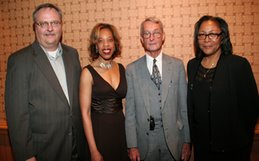True or False? Negative attack ads work only because we allow them to work.
What Will It Take to Improve the Dialogue of Democracy?
(The following came to me from the Center on Congress at Indiana University. It was written by Lee Hamilton. I've previously posted about this topic and believe that Hamilton says it best. If you agree with this idea, make a comment, if you don't agree, make a comment, and please consider your comments as a beginning in improving the dialogue of democracy.)
As this election season gets underway with its television ads, debates and non-stop campaigning, I've been struck by something I keep hearing as I talk to people about our political system: They're disappointed.
Generally, election years are hopeful times, but people now are sour not just about this year's elections, but about politics in general. They're unhappy with the quality of the political discourse they hear: in House and Senate debates, in comments from our elected leaders, in arguments on the campaign trail. The dialogue of democracy is not measuring up to their expectations.
In part, this is fed by the public's weariness with the partisan, vituperative, posturing, blame-fixing- or blame-ducking- nature of much of what passes now for political conversation. People feel taken for granted and manipulated, as though their leaders, along with the pollsters and consultants they rely on, see them as little more than a series of little hot buttons to be pushed or suppressed.
But there's more to it than that. Americans are missing a sense of really serious engagement by our political leaders with the difficult issues that face us; they don't see politicians grappling with them in thoughtful ways, nor do they feel challenged by their political leaders.
It is hard, watching recent presidential campaigns and listening to the latest crop of statements from this party leader or that, not to think back to events like the Lincoln-Douglas debates, in which two great minds wrestled with the problem of slavery and all of its nuances over seven appearances together. Or to remember that our founders, for all their skills as practitioners of the political arts, also addressed the political challenges of the day with intellectual brilliance, competing for public support both as politicians and as thinkers about how their new democracy ought to work.
There is very little to compare with such substance in the contemporary political dialogue. Too often now, politicians flit from one topic to the next, brushing over three or four issues at a go. They may feel strongly about these issues, even passionately, but it's hard to escape the sense that everything they say has been focus-group-tested to within an inch of its life. Their speeches, which you'd think would give them a chance to explore matters in depth, often lack serious content or evidence of deep thought.
Instead, they are filled with sound bites carefully crafted to make it onto the evening news, and with much tut-tutting about the problem but precious little about the solution.
There is a cost to this, and we all pay it. Pollster Richard Harwood has been talking to Americans since the early 1990s about their feelings about public discourse. What he has found is unsettling. "People cannot find in the current public realm a sustained force for truth-seeking and the promotion of the public good," he wrote recently. "Noticeably missing is a sense of possibility and hope. In their place stands a politics and public life driven by manipulation, personal positioning, and material gain."
A key and disturbing result of this, he believes, is that many Americans have simply given up on participating actively in public life, retreating into their own lives in search of some sense of normalcy, control and, I suspect, truth.
So what can we do about this?
First off, I believe that we should expect disagreement, vigorous debate, and even passion. We face very tough public policy problems as a nation, and the more points of view that grapple with them, the better. I realize that a segment of the American public is uneasy in the presence of discord and controversy. But these are natural parts of a democracy that is working. Robust debate is healthy. Competition for power lies at the heart of our system, and an intense struggle for votes that is marked by the clashing of ideas, respect for the facts and a certain humility is to be encouraged, not feared.
This is true, however, only if it is carried on under certain rules. Healthy debate is characterized by the collision of strongly held views, of course, but also by politeness, graciousness, respect for one's adversary, reasonableness, tolerance, and a basic integrity. It is also marked by a search for pragmatic solutions, consensus, and the public good.
When the next set of attack ads appears on your television screen, remember that. How public discourse is conducted makes all the difference in the quality and effectiveness of governing.
So now is the time to act. As in all things in a democratic government, it is up to us as voters to make it clear to politicians if we are dissatisfied with how they carry on the public debate. Attacks and negative advertising work only because we allow them to. But if you let your politicians know that you don't like excessive partisanship, superficiality or name calling, and that you want to hear about solutions, not just a statement of the problem, they will hear you.
I think it's probably too much to expect our political leaders to reach the heights that Thomas Jefferson, James Madison, Abraham Lincoln or Stephen Douglas did. But it is not too much for us to expect them to try.
Lee Hamilton is Director of the Center on Congress at Indiana University. He was a member of the U.S. House of Representatives for 34 years.
Friday, July 07, 2006
Subscribe to:
Post Comments (Atom)

No comments:
Post a Comment